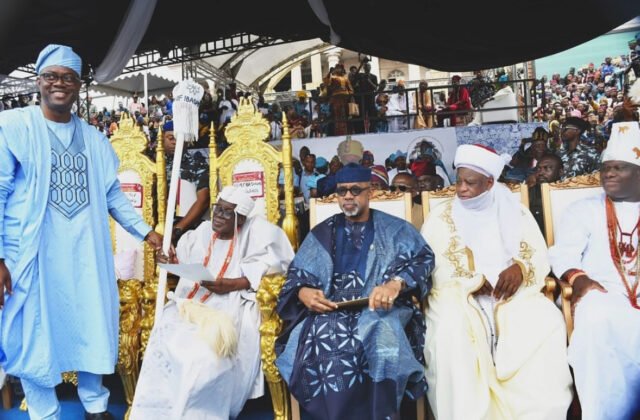Let me— for the sake of those, especially the governor of Oyo state, Seyi Makinde, who’re bent on inserting disparity, which could eventually wage war against smooth path to Olubadan throne, into the well structured Ibadan Chieftaincy System— take an excerpt from the book, ‘Modernity and Tradition in The Politics of Ibadan (1900-1975) written by Justin Labinjo, perhaps the governor and his cohorts would be persuaded to take a step back and correct the anomaly that was, in conjunction with the Oyo State House of Assembly, advertently and surreptitiously injected into the 1957 Olubadan Chieftaincy Declaration, the one that was allegedly targeted at the Otun Olubadan of Ibadan, Sen. Rashidi Adewolu Ladoja, to thwart his aspiration to mount the Olubadan throne after the reign of the current Olubadan of Ibadan, Oba Owolabi Olakulehin.
It’s necessary to bring this to the notice of the governor and those who care to know more about the source of the Ibadan Chieftaincy System for the book succinctly explains how the system came to being. And it goes thus:
“People were given titles in Ibadan from very early time as rewards for their contributions to the society. The number of such titles has increased, some of the old once have disappeared while many others have been introduced. Some have become more important than they used to be. Principal additional titles were introduced by Fijabi (Baale 1893-1895); Fajimi (Baale 1897-1900); Bashorun (Baale 1900-1902); and Apampa (Baale 1907-1910). A few of the present junior titles have been created since 1910.”
The book states: “Immediately before the colonial intervention, native administrative organisation comprised of Baale and thirty other chiefs. They formed the general council. That traditional governing council was divided into two spheres: the military (Balogun line) and the civil (Otun or Olubadan line); though the two spheres met as one council.”
It further states: “There were four main lines of chiefs as described thus: The Balogun headed the military line, while the Baale was at the top of the civil line. Each line had titles which indicated their positions beside their leaders on the battle-field or their order of sitting at meetings. The younger and unproven men had their own line which was headed by a Seriki – a young warrior of distinction. A fourth line was created to represent women. The women line was civil and headed by Iyalode.”
Finally the book opines: “Once a family had a chief of any importance, that family would acquire some sort of prestige in society. The chief’s successor is recognized as Mogaji – a Hausa word meaning ‘first born’. The Mogaji needs not, however, be the first son of the late chief. More often the oldest man in the family is chosen, but ability and character are usually considered. The seniority, and therefore, the promotional structure of chieftaincy from the 1930s is as follows:
Baale/Olubadan line – Olubadan, Otun Olubadan, Osi Olubadan, Ashipa Olubadan, Ekerin Olubadan, Ekarun Olubadan, Abese Olubadan, Maye Olubadan, Ekefa Olubadan,, Agbaakin Olubadan, Aare Alasa Olubadan, Ikolaba Olubadan, Ashaju Olubadan, Ayingun Olubadan, Areago Olubadan, Lagunna Olubadan, Ota Olubadan,Aregbeomo Olubadan, Gbonka Olubadan, Areonibon Olubadan.
Balogun line – Otun Balogun, Osi Balogun ,Ashipa Balogun, Ekerin Balogun, Ekarun Balogun, Abese Balogun, Maye Balogun, Ekefa Balogun, Agbaakin Balogun, Aare Alasa Balogun, Ikolaba Balogun, Ashaju Balogun, Ayingun Balogun, Areago Balogun, Lagunna Balogun, Ota Balogun, Aregbeomo Balogun, Gbonka Balogun, Areonibon Balogun.
Seriki line – Seriki, Otun Seriki, Osi Seriki, Ashipa Seriki, Ekerin Seriki, Ekarun Seriki, Abese Seriki, Ekefa Seriki.
Iyalode line (Head of Women) – Iyalode, Otun Iyalode, Balogun Iyalode, Osi Iyalode.
Now, going by the above arrangement being laid down by the Ibadan ancestors, it’s clearly seen that the process had already created a rancour-free ascension to Olubadan throne. Perhaps the reason the uniqueness in the process is unarguably admired all over the world. Ibadan is without a doubt the only town in Nigeria which has recorded nary crisis regarding ascension to royal seat due to the unmatched and unequal process.
For instance, successor to the throne of Alaafin of Oyo, after the demise, close to two years now, of Oba Lamidi Adeyemi, is yet to be chosen owing to the disagreement in some quarters. Also there are some towns across Nigeria which at the moment experience royal tussles that their end is not yet known.. We’ve seen a situation where some kings were disgracefully dethroned through litigation after many years of being on the royal seats. These cases have never been experienced in Ibadan due to the well arranged chieftaincy system passing on from one generation to another generation. And I don’t think it’s wise to allow this to happen in Ibadan.
The Ibadan Chieftaincy System was so well designed to the extent that the next ten heirs to Olubadan throne are known even before their times are riped. Isn’t this something to be proud of? So, why would anyone (politician) be bent on tampering with the age-long tradition, and break the peaceful accord which has been in existence in the midst of the Ibadan chiefs? Why would the system that identify Ibadan as a unique town, whose process is widely admired, be destroyed?
Prior to the installation of Oba Owolabi Olakulehin on Friday 11th July as the 43rd Olubadan of Ibadanland, there were controversies which, had they not been carefully handled, would have stood as a hinderance to the coronation of the new king. Apart from the allegation of unstable health of the then Olubadan-designate, Oba Olakulehin – the controversy Gov Makinde described as one of the factors that influenced the late coronation – the litigation in the court over the beaded crowns bestowed on some High Chiefs that Sen. Ladoja reluctantly withdrew from the court would also have been a stumbling block to the recent coronation.
After it was confirmed that the Olubadan-designate was fit to mount the throne; that the amicable settlement over the disagreement between Sen. Ladoja and other High Chiefs had been effected, and that the withdrawal of the case from the court was being implemented- many believed that the parties involved in the skirmish had sheathed their swords and the crisis had been laid to rest until an unusual and unprecedented case was presented by the governor at the scene of the coronation.
People, most especially the Ibadan indigenes, who were in the scene of the coronation were shocked and astounded when they discovered that the details of the draconian amendment to the 1957 Olubadan Chieftaincy Declaration were part of the program of the coronation. It was in fact disheartening to see the unjust amendment to the Chieftaincy Declaration being distributed during the coronation for people’s perusal. Only God knew why Gov Makinde chose that particular occasion to unveil the unfair review.
The review, in section 4, of Olubadan Chieftaincy Declaration states:: “The person who may be proposed as candidate by the line whose turn it is to fill a vacancy in the office of the Olubadan shall be the most senior Beaded Oba in line.” This is against the original Olubadan Chieftaincy Declaration of 1957 in which it’s stated in that, “… candidate by the line whose turn it is to fill a vacancy in the office of Olubadan shall be the most senior (High) Chief in line.”
It was reported that this amendment was targeted at the most senior High Chief who still decline to wear the beaded crown. At this juncture, I think it’s imperative to remind and bring to the notice of Gov Makinde that it’s illegal and morally wrong to change the rule when a contest has already commenced. The Otun Olubadan of Ibadanland, Sen. Ladoja joined the race when the most senior High Chief not the most senior Beaded Oba was a heir to Olubadan throne. Besides, the Oyo State Chief’s Law do not donate the power to amend the 1957 Olubadan Chieftaincy Declaration to either a governor or the State Assembly. So, why did the governor ever start the fight his administration could not win?
To avoid stagnation in the process that enthrone Olubadan of Ibadanland, Ibadan elders need to take it upon themselves to persuade Gov Makinde to go back to the drawing board and rectify the error implanted into the 1957 Olubadan Chieftaincy Declaration. This is necessary in order to return the ascension to Olubadan throne to its original status. Ibadan is a peaceful town, and anything that could stand against peace in the town should be discouraged.
Ìbàdàn ò ní bàjé o!
Ademola ‘Bablow’ Babalola
































